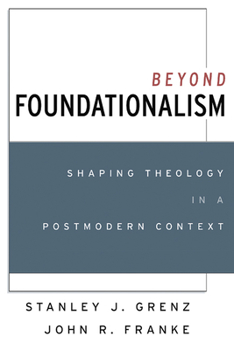Beyond Foundationalism
Select Format
Select Condition 
Book Overview
The authors move past the Enlightenment foundational approach to offer a revolutionary methodology for doing theology in a postmodern age. Their method uses three sources: the Spirit speaking authoritatively through the biblical text, tradition providing a historical interpretive framework; and culture as context for constructive theological reflection.
Format:Paperback
Language:English
ISBN:0664257690
ISBN13:9780664257699
Release Date:March 2001
Publisher:Westminster John Knox Press
Length:298 Pages
Weight:1.09 lbs.
Dimensions:0.8" x 6.0" x 9.0"
Customer Reviews
3 ratings
Best Book I Have Read on Theological Method!
Published by Thriftbooks.com User , 15 years ago
Is an Evangelical faith still possible in light of the rise of postmodernity? Must one choose between universal standards or radical relativism? Or can postmodernity provide a new form of foundation from which an Evangelical theology can grow? Published in 2001, Beyond Foundationalism: Shaping Theology in a Postmodern Context by John R. Franke and the late Stanley J. Grenz sets itself to answering those questions. Grenz and Franke divide the book into three sections. The first section dedicates itself to identifying the historical situation in which contemporary theology finds itself. In this section, Beyond Foundationalism begins by discussing the mutual fragmentation and collapse within both conservative and liberal schools of theology. From this position the book presents the collapse of modernity as an opportunity to rise above the modernity's search for a universal, unchanging position. Instead, Grenz and Franke propose a "localized" theology. They propose a theology that speaks to and for each individual community, a theology that concerns itself with Spirit-filled living rather than superimposed doctrinal absolutes. They hope to "foster conversation about and participation... that will nurture an open and flexible theology that is in keeping with the local and contextual character of the discipline, that remains thoroughly and distinctly Christian, and that fosters a renewed listening to the voice of the Spirit speaking to the churches through the scriptures" (p.27). The second section of Beyond Foundationalism discusses "Theology's Sources": scripture, tradition, and culture. In short, the book argues that the Scriptures provide theology's "norming norm." While one cannot simply point to a verse to prove reality or "Truth," the scriptures provide the source and cannon for the Spirit's working in the community. Tradition establishes the "Hermeneutical Trajectory" for the community. Borrowing an illustration from N.T. Wright, Grenz and Franke argue that which tradition provides the first four acts of a five-act play. The Church is the actors. However, the fifth act is unscripted. The actors must improvise based on the first four acts. They must develop the characters and story in a manner congruent with the first four acts. In this way, Church history provides and authoritative direction if not an authoritative cannon of standards. As the final theological source, culture provides theology's "Embedding Context." Theology should not assume to speak universally, to all generations. Instead, the Church is to understand that its answers are to specific questions raised by its cultural context. As much as it may hope for an a-cultural position from which to judge culture, theology is unavoidably shaped and formed by the culture in which it finds itself embedded. The third section of the book focuses on "Theology's Focal Motifs." The first motif is the Trinitarian nature of God. The second motif is community. The third
very good
Published by Thriftbooks.com User , 21 years ago
I found the book to be very good. It has concentrated contents with in-depth theological thoughts.
Up-to-date(ing) Evangelical theology
Published by Thriftbooks.com User , 23 years ago
As a pastor (from a fundamentalist and Neo-orthodox background) who tries to keep up with what is going on in theology, I found this a fascinating read. Written from an evangelical point of view, it is a very sophisticated engagement with a wide range of theology, past and present. Each chapter has excellent historical background to introduce present theological engagements, as a prelude to the authors' own development of the topic. There is a stead critique of the failure of the Enlightment project and of foundationalisms, including evangelical foundationalisms regarded as inadequate in the post-modern context. The discussion of epistemology was very interesting, especially Reformed epistemology. (I have already ordered W. Jay Wood's Epistemology: Becoming Intellectually Virtuous; part of the value of the book to me is new leads to explore). There is also much dialogue with Pannenberg, about whom Grenz has written a great deal. The discussions of the Trinity and of the place of community are very well done. The book is well written and has helped bring me to date on what I think will be an ongoing area of theological work, (more especially by evangelicals?) It would be interesting to see these authors' evaluation of Milbank and Radical Orthodoxy. However I can imagine that a lot of evangelicals are a bit alarmed as to where all this is going.





